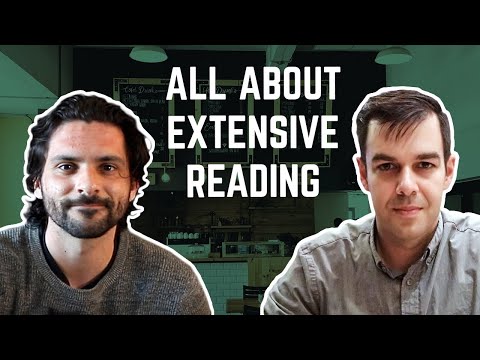As many of you know, Luca Lampariello is a phenomenal polyglot, mastering fourteen languages [as he says “more or less”], and invariably with excellent pronunciation.
Having produced many outstanding videos Luca’s latest venture is an internet course explaining his theory of “bi-directional translation”, which he often refers to as the underpinning for his language development.
As ever there are many Luca points which resonate. On the elusive target of “fluency” Luca points out that this is essentially a mirage: “There is no clear standard, there is no finish line at the end of a race, and like the horizon - as you run towards it, there is always more road to travel!”
As an alternative to targeting “fluency” Luca wants language learners to focus on “moving forward every day”. His five basic principles also make a lot of sense:
- Consistency. Schedule consistent time for language learning and do it every day.
- Develop skills in all four key areas - reading, listening, speaking and writing.
- Interleaving. This is his view that you must integrate all four modes and not keep them separate.
- Repetition, and of course the generally accepted theory of “spaced repetition”.
- Above all: “place value on skills rather than knowledge”. Luca often uses the example of riding a bike as a skill, because once you know how to do it, you basically never forget. I would say the same is probably true for many other activities, such as swimming.
I can follow Luca in focusing on skills and also on the important sub-skills of intonation, pronunciation, and reading speed. He gives some good examples in a variety of languages. However, although his “bi-directional translation” [BDT] method clearly works for him, and for many people he has coached, would it work for everyone?
Where I start to part company with his BDT theory is further along the road, rather than just the beginning stages of acquiring a new language.
His method consists of six steps:
- intensive analysis of a short text by “listening and reading.” We can all agree on that, especially if you can listen to a native speaker while reading the text, which has become so much easier with mechanisms like Audible Books, LingQ or the “Easy Languages” organisation. Steve Kaufmann is particularly good in this regard, encouraging listening while “doing dishes, exercising, and cleaning out the garage.”
- phonetic analysis, especially by adding “pitch contours” to the text. Luca gives an example from Swedish where, although he was quite advanced in the language, he suddenly discovered that pitch was actually quite important and significantly changed the meaning of words. Because he speaks so many languages, Luca is able to compare and contrast these important points such as stress, pitch, and intonation, and this is very informative.
- Smart Review: essentially “repeat the text in different ways to consolidate it." With difficult texts, people tend to do this naturally anyway. Luca here seems oddly quite prescriptive: start with reading and listening at the same time; then you just listen; next, listen while reading the text in your own language or a language you know well; then read the text aloud. The more variety you have, the more likely you are to internalize the grammar and vocabulary points. Fair enough. This seems reasonable, if a bit cumbersome.
But we are only halfway there at this point, with three more BDT steps to go. It is here, with respect, that Luca’s methodology starts to become, in my opinion, unnecessarily tedious. Step Four is to “translate the text directly into your native language”. This may be a good idea when starting with a new language, but at an intermediate level this would certainly slow the pace to a debilitating level. Step Five is to do “reverse translation” orally of your own translated text. And then the final Step Six is actually to write down your “reverse translation”. No doubt in this “see saw” translating you would certainly “notice” some interesting features of both languages in the process, but surely everything is guaranteed to slow down to a snail’s pace? With all the texts you read every day, how would you ever have time for this methodology? And surely Luca cannot do this in all his fourteen languages?
Perhaps Luca means that this BDT method should only be used in the very earliest stages of acquiring a new language? It is not clear. We will have to wait for a promised further course on his BDT method.
In my opinion many of the differing roads in language acquisition lead to Stephen Krashen. While at the outset for any language, when it is the proverbial “wall of noise” it can be very useful to “listen and read” short chunks of text [such as the LingQ mini-stories], translate back and forth and listen very carefully to pitch, rhythm and intonation. But there comes a point when you need to fly free of any such BDT straitjacket. The basic beginner level was well described as “language pain” by Jared Turner, where you understand less than 90% of the words used:
But then you move on to “intensive reading” with a higher level of comprehension, with a range of 90% to 98% known words. There are still some words that need to be looked up or guessed, but the speed increases. And then you get to the third level of “extensive reading,” when at least 98% of the words are already known. This is where the experts such as Professor Krashen believe the most progress can be made. Some of the occasional mystery words may be completely new, or you may have a “shaky” understanding of them, especially in a new context, but huge progress is made; see Stephen Krashen, Explorations in Language Acquisition and Use (Heinemann, 2003). Professor Krashen points out that "reading teaches you spelling, grammar, and writing style - and you pick up a large amount of vocabulary and knowledge”. His various YouTube videos constantly stress “comprehensible input”, preferably from compelling material, and that seems to me the proven pathway to language acquisition.
However, what all this “reading, reading, reading” probably does not do is to give you the supreme pronunciation skills that Luca has. But is that so important for you? Professor Krashen himself quotes his “language therapist” Steve Kaufmann: “Don’t worry about making mistakes when you talk; nobody cares!”
It would be interesting to know what other people think of Luca’s BDT method. Is this just for beginners? Or useful at all stages? And does it complement or contradict the Krashen approach?

